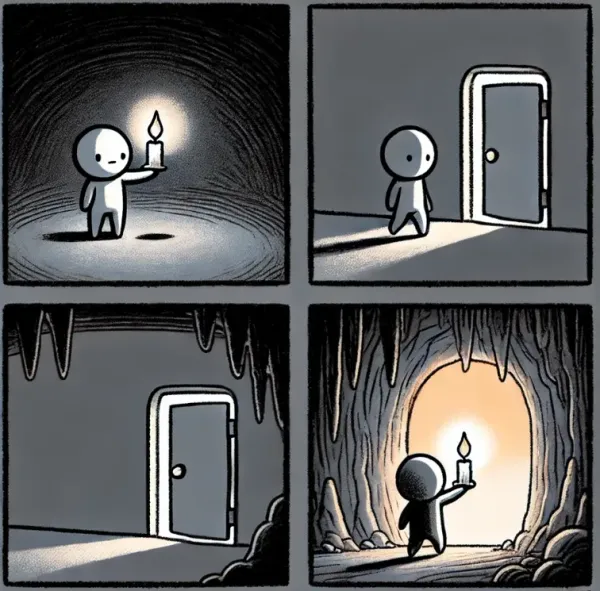For The Person Who Has Everything
Are we missing out on the most important thing?


What do you get the person who has everything?
This is a question that can help define our era.
Our society is currently shifting in a simultaneous combination of two ways. There’s a bottoms-up revolution in our collective worldview (the topic of my last piece). There are also signs of a top-down shift in mindset happening among individuals at the very highest levels of power. These “hyperagents” hold a historically-unprecedented concentration of wealth, power and resources. Twenty six people currently own as much as the bottom half of humanity.1 So the positive leverage from them changing their mindset is immense.
The most likely time for a hugely influential person to change their worldview is when the approach that brought them their prior success stops working.
The kind of focused willpower that leads to greatness is an accelerator. When you’re on the straights it can be incredibly powerful. But when the road turns unexpectedly, a faster car just means you crash harder. A winding road, changing circumstances, requires employing a different kind of mindset: the steering wheel.
A steering wheel alone has you spinning in circles. But, paired with a powerful accelerator, you’ll be speeding around the track in no time.

“Steering Wheel Mindset”
Broad attention, a sensitivity to subtle cues and an intuitive sense of the whole are all features of “steering wheel mindset.” Although it’s a style of thinking that’s currently out of fashion, it has long had an essential evolutionary role to play in human culture.
I recently interviewed John Vervaeke on the topic of wealth and wisdom. In one of his early lectures, he talks about the concept of “soul flight.” A tribe’s shaman would put themselves into the flow state and generate the experience of flying over the world.2 This allowed them to get a literal “overview” of a complex situation and help the tribe move forwards safely. In today’s world the shaman's domain isn’t nature, but the landscape of ideas. And we’re starving for fresh perspectives.
In the West, we often utilize the flow state as a means to achieve individual peak performance. We can learn faster, become better tennis players or traders. Other times we present it as simply an intrinsically desirable experience. But that misses the point of this evolutionary adaptation: to generate fresh insights that can help your entire tribe.
In fact, Joseph Campbell’s hero’s journey is a narrative description of the process by which an individual leaves a stale paradigm and returns with the “boon”: a more accurate worldview. The hero’s journey isn’t finished until he comes home with the treasure. The very name of the myth, and its centrality to virtually all cultures, indicates that this isn’t some fringe skill, but the human ideal.
This insight is at the heart of the work of the remarkable classicist and mystic Peter Kingsley. In a lecture from 2011 he repeatedly and forcefully made this point.
Spirituality is not about “me.” We’ve come to this crazy, ludicrous situation where we’ve actually come to believe that spirituality is about me and my progress and my spiritual evolution and my growth and that is a complete corruption of what spirituality is. And it makes me just want to give up and stop saying we’re doing anything, especially in America because it is so horrifically perverted. Spirituality is about the culture we live in. Shamans understood this very well.
Vervaeke argues that hunter-gatherer groups that had a shaman would outcompete groups that didn't. This is why the shaman figure has always been a relatively universal feature of human societies. In the West this is no longer the case. We don’t even have a word for them, let alone a central role. And as a result we are steering straight into the wall.
This argument was further reinforced in another remarkable recent Emerald podcast on the cultural role of intuitives. With the emergence of modernity, the intuitive wasn’t only marginalized, but in many cases actively repressed and persecuted. In a society that celebrates the singular focus and drive of the accelerator mindset, the seer might advocate for pumping the brakes. Our latest techno-cult of “e/acc”, or effective accelerationism, seems directly opposed to this mindset. Moreover, in begging us to turn the turning the wheel away from the onrushing wall, the shaman proposes ideas that can initially sound insane. This threatens the single-minded dominance of whoever happens to be in charge. They used to burn heretics, now we just fire them. But all transformational ideas must start at the fringe, the edge of the village.
“What’s in it for me?”
A lot of spiritual literature emphasizes the importance of surrendering your egoic willpower in service of some vague greater good. Hand back the keys to your G6 private jet, downgrade the lifestyle and upgrade the philanthropy.
But the harsh fact is that the evidence suggests that this isn’t proving a very effective sales pitch! This is because the highly-effective and successful person is entitled to ask: what’s in this for me?
Translated to modern times, the ancient “shamanic” techniques give us access to the kind of intuitive visions that can help renew our culture. The shaman that saves the tribe at a time of crisis will be remembered for generations. We may not be comfortable thinking of them this way, but many of science’s most transformational insights are closely associated with visionary states. Felix Hoffmann's synthesis of aspirin was influenced by a dream of white willow bark. James Watson's dream of a spiral staircase played a role in the discovery of the double helix structure of DNA. Dmitri Mendeleev's arrangement of elements in the periodic table came to him in a dream. Most people think their best ideas come from their own brains, but true visionaries know they come from somewhere else.
You know who can get away with proposing ideas that sound crazy without being burned at the stake? Visionary people who already have the freedoms granted by money and influence.
Moreover, the greatest paradox is that in surrendering some raw accelerator power we gain access to a much more subtle kind of influence. Writer Alex Komoroske uses a novel framing from Lord of the Rings to distinguish between these two forms of power. There’s the egoic “Saruman” willpower we tend to celebrate, and a more subtle “Radagast” form our culture often denies even exists. Radagasts develop an intuitive sense for complex systems then make tiny harmonious interventions. They do the right things, at the right time. To an outside observer, it can even look like magic. Not only does Alex argue that Sarumans mostly become Radagasts when their willpower starts to fail them, but that the most effective people are a combination of both.
When you hit the wall you’re forced to discover the steering wheel.
Steering wheel mindset may even help us discover the magical place where what only you can do meets what the world needs. I think what most people, especially hyperagents, really want is reconnection to purpose. It’s immediately obvious when you meet someone on the right path for them. They become less comparative, less acquisitive and less anxious. Not only is their daily flow intrinsically desirable, it’s also meaningful because they can see how it serves the whole tribe. This is the big payoff.
“What’s the how?”
Between 1200 and 1150 B.C., ancient civilization witnessed the Late Bronze Age Collapse. Vervaeke describes this event as “the closest thing the world has actually experienced to apocalypse. The end of the world.” More cities went out of existence during this short period than at any other time in recorded history. There is still uncertainty and debate as to what caused it.
The Axial Age that followed produced a flowering of individual prophets and religions focused on a new theory of human meaning. From the 8th to 3rd century B.C., the world saw the simultaneous emergence of Taoism, Confucianism, Hinduism, Buddhism, Jainism, Zoroastrianism and Judaism. In modern terms, five centuries is a long time for revolutionary deas to spread. But if an equivalent paradigm shift happens again now, and there are signs it already is, the prophets will have internet access.
In Peter Kingsley’s short book A Story Waiting to Pierce You, he proposes the romantic (and well-researched) idea that Abaris, an Axial Age prophet-shaman from modern-day Mongolia, helped catalyze Western spirituality through his contact with Ancient Greeks like Pythagoras.
Kingsley describes Abaris as traveling in a trance, while holding an arrow that determined his direction. Some scholars have interpreted this to mean he was in soul flight; above the world but clearly guided on the right path.
Perhaps coincidentally, in my interview with Vervaeke he described the need for “tonos”. This is a Greek word for the kind of “tension” that’s created when you pull back a bow string. Our accelerators are our brain’s powerful, logical but limited left hemispheres, and the steering wheel is our subtle and intuitive right. Vervaeke described tonos as the “creative tension between the left and the right hemisphere that actually optimizes my ability to get a good grip on the world.” He thinks that requires adopting a dynamic, scientifically-supported set of practices to help improve your embodiment and cognition. And then you also need a community of peers, elders and mentors to support and correct you on that path.
But how do you know where to steer your car or point your arrow? The short answer is wisdom. Wisdom isn’t about the intelligence stuck inside your head, it’s about how effectively you can interact with subtle relational forces in the world around you. These can feel like love, aliveness, novelty, interestingness, excitement, curiosity or attraction. And they are fundamentally non-verbal, right-hemispheric intuitions. Pythagoras, presumably influenced by Abaris, also is credited with coining the word philosophy. It comes from philo-sophia; love of wisdom. Philosophy has come to mean playing boring word games, but true pursuit of wisdom feels like love.
A lot of contemporary spirituality focuses on the cultivation of “inner” states, but often to the neglect of this “outer”, relational feedback. Entrepreneur has written some of the most insightful content on this latter topic. It’s about very carefully watching for synchronicities or responsive reality. The total simplicity of this approach means it doesn’t get the emphasis it deserves. But thirty years of research has shown that openness to new ideas and external feedback is one of the primary correlates of wisdom. And wisdom itself correlates with flourishing and individual wellbeing.3 As it did before in the Axial Age, reconnection to wisdom may yet save us all from our own individual and societal collapse.
One of Dr. Iain McGilchrist’s central conclusions is that the right hemisphere “master” should have guidance over the “emissary” left. Although it should be obvious that you don’t steer with your accelerator, this is a direct inversion of our current cultural ethos. But the one of the most common criticisms of McGilchrist’s books is that he rarely gives specific advice how to become more right hemispheric. So how wonderful that recently wrote a spectacular piece on seven practices to bring more right hemispheric balance to our interactions with the world. He also relates this idea back to Kingsley. Kingsley often uses the word metis,described as "presence and continuous alertness." It’s an instant, decisive responsiveness to whatever opportunities the world presents to us. This is akin to balance between both hemispheres, in narrow and broad focus. The racecar gripping the track. The tonos tension aiming the arrow. Saruman and Radagast. Flow. In another beautiful piece this week, River argued that metis is “the one essential quality.” And it’s hard to disagree.
Wisdom may be the most important thing, and metis may be the essential quality that can cultivate it. The last people to understand this will be the first ones left behind over the next few years.
The most common pushback from some highly effective and successful people is that the accumulation of vast amount of power and resources is sufficient evidence that they’re already on the right path. And it’s simplistic to argue that they’re wrong just because they’re rich. I’m sure evolution rewards pursuing the right path in a variety of mysterious ways. But to point solely to a single factor, wealth, rather than the whole picture is often a symptom of the problem. And the key is to get an overview of whether all aspects of one’s life are equally balanced. Is jamming the accelerator driving you towards the wall?
McGilchrist closes his masterpiece, The Matter With Things, with a story told by a member of the Swiss Parliament Lukas Fierz:
“Jung told us about his encounter with a Pueblo chief whose name was ‘Mountain Lake.’ This chief told him, that the white man was doomed. When asked why, the chief took both hands before his eyes and – Jung imitating the gesture – moved the outstretched index fingers convergingly towards one point before him, saying ‘because the white man looks at only one point, excluding all other aspects’.”
Later in life, Fierz met a successful industrialist and self-made billionaire.
“I asked him what in his view was the reason for his incredible entrepreneurial and political success. He took both hands before his eyes and moved the outstretched index fingers convergingly towards one point before him, saying ‘because I am able to concentrate on only one point, excluding all other aspects’. I remember that I had to swallow hard two or three times, so as not to say anything …”
What do you get the person who has everything? A better steering wheel.
Related Reading & Listening:
Read. The Sarumans and The Radagasts by Alex Komoroske (25 minute read)
Why read. This is hands-down one of the best things I’ve read lately. Alex uses a novel framing from Lord of the Rings to distinguish between two forms of power. There’s the egoic “Saruman” willpower we tend to celebrate, and a more subtle “Radagast” form our culture often denies even exists.
Key quote: “Most people are never able to command any kind of magic. But if someone has a magic, they are likely to have Saruman magic first. The totalizing logic of this magic can trap them; its effectiveness is very hard to let go of, especially for the lucky few who have achieved significant success from it. “It’s been so effective before, so just do it again. If it doesn’t work this time, then try again — harder.” Radagasts sometimes start with the Radagast magic, but more often they get there by first developing Saruman magic, and then having gone through a crisis: being forced to confront the abyss, and surviving.”
- Read. Solving McGilchrist's Big Problem (or, fix right hemisphere imbalance with these 7 weird tricks?) and The One Essential Quality by (32 minute read and 27 minute read).
- Why Read. ….And these two articles by River are the other standout recent reads of the last few months. In the first, he rightly notes that, for whatever reason, McGilchrist rarely gives clear instructions on how to become more “right hemispheric.” So he tackles this question with 7 practices, many of which were new to me.
… River then somehow followed this up with an arguably even better piece on metis and why it’s so critically important, yet elusive, in the modern corporate world.
Read. Information That Would Get Your Attention by Morgan Housel (11 minute read).
Why read. Kindly flagged in Eric Markowitz’s exceptional weekly newsletter, The Nightcrawler. In the context of today’s piece, understanding the role of luck would show you who was using which kind of power.
Key quote: "That got me thinking: What would be the most interesting and useful information anyone could get their hands on? Years ago I asked that question to Yale economist Robert Shiller. 'The exact role of luck in successful outcomes,' he answered. I loved that answer, because nobody will ever have that information. But if you did, your entire worldview would change. Who you admire would change. The traits you think are needed for success would change. You would find millions of lucky egomaniacs and millions of unlucky geniuses. The fact that it’s impossible to possess this information doesn’t make it useless – just thinking about how powerful it would be to have it forces you to ponder a topic that’s important but easy to ignore."
Listen. For the Intuitives (Part 2) by The Emerald Podcast (1 hour 58 minute listen)
Why listen. Joshua Schrei consistently produces content that’s both incredibly differentiated, but also has the unmistakable ring of neglected truth to it.
Key quote: “Across the globe, the arrival of 'civilization' brought with it the persecution of the seer, the shaman, and the visionary. Why? Perhaps it is because civilization, with its narratives of individual agency and control, its relentless emphasis on forward progress, its commitment to the removal of mystery from daily life, and its encouragement of numbness over feeling, is fundamentally at odds with the seer's sensitivities and alignment to larger forces beyond human control. So modernity pushes the seer to the fringe — and once cast aside, seeing can veer into charlatanry and delusion. The rise of free market spirituality and New Age conspiracy is a result of the unmooring of the seer from traditional context. Yet what this points to isn't something 'wrong' with seeing or spirituality. It points to the need for context in a larger culture of disconnect and fragmentation, for slow learning and earned wisdom within a culture that always rushes things outwards. Dichotomized narratives that pit scientific rationalism against the spiritual, shamanic, or oracular ignore the central importance that spiritual movements play in culture. Visionary movements drive all aspects of culture, including scientific innovation. And ultimately — as science itself tells us — having a 'fringe' that sees things differently than the mainstream is absolutely essential to the growth of culture. So perhaps the modern-day seer must re-learn what it means to find anchor and context and earned wisdom, just as society must remember that the seer is vitally important.”
The information provided is for educational and informational purposes only and does not constitute investment advice and it should not be relied on as such. It should not be considered a solicitation to buy or an offer to sell a security. It does not take into account any investor’s particular investment objectives, strategies, tax status or investment horizon. You should consult your attorney or tax advisor.
The views expressed in this commentary are subject to change based on market and other conditions. These documents may contain certain statements that may be deemed forward looking statements. Please note that any such statements are not guarantees of any future performance and actual results or developments may differ materially from those projected. Any projections, market outlooks, or estimates are based upon certain assumptions and should not be construed as indicative of actual events that will occur.
Full quote: “If you are a hunter/gatherer group and you have a shaman, you're going to outcompete groups that don't. There's a reason why it's universal. There's a reason why the flow phenomena is universal. Because this exapts some of our most basic machinery [and] enhances it in a powerful way. The shamans have a very interesting kind of experience. They go through this transformation. They often experience what's called "Soul flight" as if they've gone to another world and they're flying through it. This is the origin - think of how we've come to this - but this is the origin of "getting high". In the shaman, does this.... The shaman experiences themselves as if they're flying above the world. Why? Why would the brain generate that? Well think about this. The shaman is getting a much more comprehensive grasp of more complex patterns. But they're experiencing it mostly intuitively and metaphorically. Where are you when you get a bigger picture of things? You're above them.” ↩
Source: “Summarizing 30 years of empirical wisdom research, this study is the first to provide meta-analytic insights into the correlates of wisdom. It demonstrates that despite differences in conceptualizations of wisdom and in measurement approaches, wisdom is robustly associated with constructs such as openness, hedonic well-being, and eudaimonic well-being.” ↩




